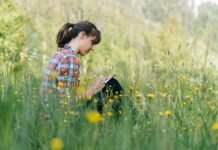There are many meaningful ways to reflect on the importance and beauty of earth—perhaps none more poignant and simple than the Japanese art of Shinrin-yoku.
It is easy to go days, months, and—dare I say it—years, without physically connecting with the raw power and serenity of nature. Even today, as we celebrate ‘Earth’—many of us do so surrounded by walls with perhaps a view of something green.
Whatever your plans, demands or other obligations we all need nature to inspire our spirits and restore our instincts. One of the simplest ways I know to do this, is to emerge yourself amongst the trees, breath the air of open winds and wooded scents, touch the earth and feel it’s energy, awaken your soul and celebrate life.
City folk stroll to the closet park, urban dwellers retreat to your gardens, everyone everywhere if you can find a forest to bathe in…

Allow me to introduce a friend of ours, a fascinating guy with a passion for fitness and a fondness for forests.
David Boycott-Brown is the Director of Elite Athletes, a sports performance company supporting international, world-class and Olympic-level athletes. Previously he was Head of Strength and Conditioning for GB Water Polo at the London Olympics 2012. Additional experience includes working with MMA fighters competing in the UFC and professional cyclists at the World Cycling Centre.
So how doe’s David celebrate Earth Day?
Shinrin-yoku is a Japanese word which can be translated as “forest bathing” or taking a leisurely trip to the forest. This is done to wash away the stresses of daily life, reconnect with nature and boost health. Many scientific studies have been conducted to investigate the benefits of “shinrin-yoku” with prime areas of research including cognitive function, stress reduction and general wellbeing from both a mental and physical perspective.
It is intuitive for a lot of people to get outside in nature and participate in physical activity, whether it be walking, running, riding or some other favourite pursuit. Many feel the call of the great outdoors and find it more appealing than training in gyms or breathing hard in polluted areas. However many studies from a western scientific perspective are now investigating the ancient knowledge held within many traditional cultures such as “shinrin-yoku”.
The benefits of exercise on health, strength and happiness are well documented and range from improved immune function, a stronger musculoskeletal system and positive mood states. The principle of “shinrin-yoku” may suggest that the combination of physical exercise within a natural setting, such as a wooded area, may provide even greater rewards.
The benefits on the Mind are difficult to discuss with relation to western scientific literature due to debate regarding what the mind actually is. The mind is related to difficult areas such as memory and consciousness. Fields such as neuroscience and psychology struggle to explain and when added to the attempts of religion and philosophy, the area of debate can deter people. Topics such as mental health, mood and cognitive function are generally easier for many rational minded scientific individuals, all of which can addressed in relation to “shinrin-yoku”.
Dr. N. Wells is an environmental psychologist who studies the effects of the environment on health and behaviour. She has written a number of studies which detail the improvement in cognitive functioning in children who have access to natural or rural environments when compared to their urban dwelling counterparts. Helping to preserve or improve the function of the brain in children is one way to ensure the “childrens fire” continues to burn bright. If you don’t live in a rural setting this is not a problem as a weekly or monthly visit can provide a significant boost.
There is obviously a strong connection between the body and the mind with a complex feedback loop between the psychology and the physiology and both areas affecting the other. From a physical perspective there is again much documentation which details the positive affect on mood states following increased secretions of “positive” hormones, stimulated by physical activity.
Dr. M. Yamaguchi has written many books and journal articles which detail the reduction in stress hormones when exercising in forest environments compared to urban settings. As exercise creates a physical stress on the body (this is a “good” stress as the body can make beneficial adaptations to this stress), further stressors from the environment are undesirable. The fact that environmental stress upon the body can be reduced by exercising in the forest means the body can focus more closely on the “good” stress that can gained from the exercise rather than fighting the negative aspects of pollution.
The positive affects on the soul are harder to study, put down in words or quantify in any way. The positive effects “shinrin-yoku” have on the soul need to be experienced first hand. If you take anything from this article, go out into nature, take a bath in a forest, breathe in the pristine air and even engage in some physical exercise if you feel inclined.
















